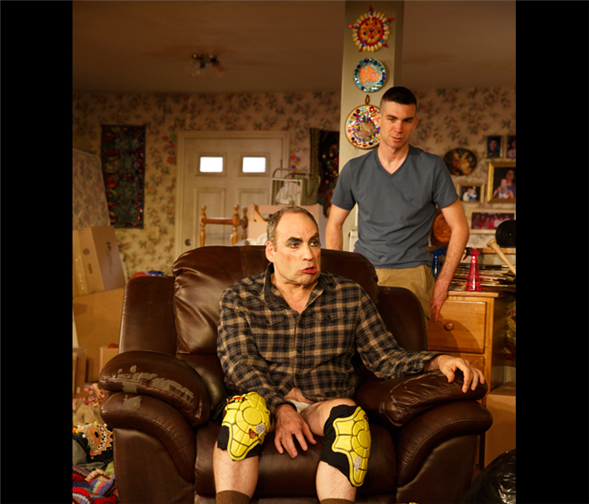Translate Page

Taylor Mac's new play is a comedy to take seriously
---
How's this for a revelation? Asked what he's learned from directing Taylor Mac's play Hir for the third time, Niegel Smith happily exclaims, "The show can have a ceiling!"
In one sense, he's being very literal. Now at Playwrights Horizons after previous runs at Mixed Blood in Minneapolis and the Magic Theatre in San Francisco, Hir is being staged on a realistic set. A subversive domestic comedy, it follows a family in the aftermath of their patriarch Arnold's debilitating stroke. Suddenly freed from his years of abuse, his wife Paige completely reorders her universe, letting housework take a back seat to museum trips, pursuing healing regimens like therapeutic shadow puppetry, and getting genial revenge on Arnold by dressing him in a flirty nightgown and clown make-up. This distresses her son Isaac, who's just back from fighting a war and wants to be comforted by a world he remembers, but the new paradigm is great for Max, who was once Isaac's sister but has since come out as a trans man.
Obviously, the play has a lot to say about a world where straight white men aren't running things anymore. (The title, for instance, is Max's preferred gender pronoun, as opposed to "his" or "her.") And in previous productions, these ideas unfolded in a less realistic context that emphasized the script's radical thinking. But Smith and Mac wanted to know how the writing would resonate in a more familiar setting.
"The play has always asked to have a kind of absurd realism, and [in earlier versions] I've pushed it more toward the comic and the absurd," the director says. "This time we wanted to stay grounded in the real and let the absurdity pop out of that. So having a ceiling on stage, having more muted colors in the costumes and the scenery and the props – it's actually lent credibility to the play.
"People took the play seriously in other iterations, but I think it feels closer to home for audience members now. Definitely me. It feels like it could be unfolding at a neighbor's home or maybe even your home."
All the comic touches, then, shouldn't cloud the fact that Hir is asking questions about gender, sex, class, and power that impact us all. "These characters are struggling to define and understand themselves, and they're wrestling with ideas," Smith explains. "They're wrestling with the idea of the family in transition and themselves in transition, and to have those ideas coming out of what we perceive as realism allows us to hear them more comfortably. We've all been young people. Many of us have children. I think those are points of entry."
It's not just the design, however, that lets us grasp how the play functions. As a director, Smith also works with his cast to clarify how they move through the room. "The first thing I think about is the way a character enters the space," he says. For instance, he wants us to see Kristine Nielsen (as Paige) "flitting and floating around the space with new permission and possibility." Even though her house is piled high with junk, she herself is totally at home. That's a striking contrast to Cameron Scoggins, as Isaac, who wanders like a dazed intruder, cautiously investigating everything from a dirty laundry to a kitchen table that somehow landed in the living room.
These behaviors give us crucial information about how the characters relate to the world of the play – and how the world of the play impacts everyone inside it.
It matters, too, that Hir only takes place in the house. Max may fantasize about running away to join a radical commune and Isaac may worry he'll end up as a homeless veteran on the street, but ultimately, nobody can climb out of the domestic pressure cooker.
"There's something tying them there," says Smith. "They all actually love their family. They desperately want them and feel defined by them. So even though they have dreams of moving out and fully embodying themselves, the most intimate relationships they have are in that room."
Or to put it another way: When your family – or your culture – is changing, you can't entirely leave. So maybe it's best to decide how you're going to live in whatever comes next.
---
TDF Members: Click here to see all of our discounted ticket offers for theatre, dance, and music.
Follow Mark Blankenship at @IAmBlankenship. Follow TDF at @TDFNYC.
Photos by Joan Marcus. Top photo: Daniel Oreskes (left) as Arnold and Cameron Scoggins as Isaac.